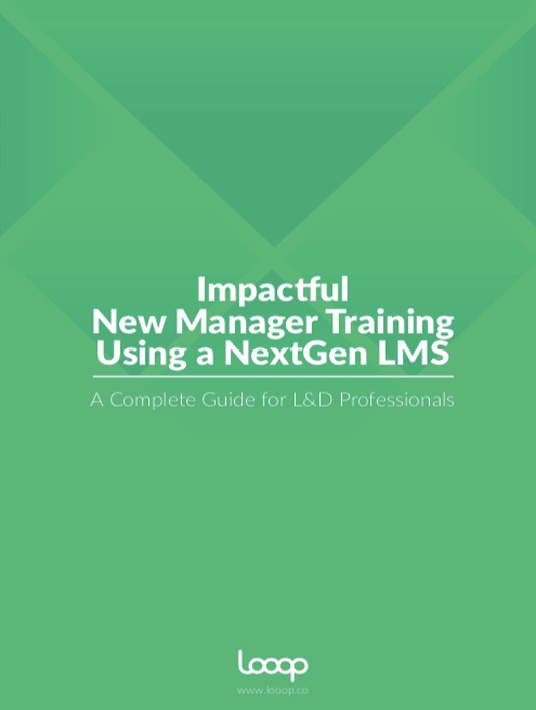Why New Manager Training Is Important In The Modern Workplace
The workplace has changed dramatically in the past few years, and L&D seems to be struggling to keep up. The modern workplace is fast, busy and digitally focused, and the need for instant answers and workflow learning is more prevalent than ever before.

Training new managers has always been important, but the workplace has transformed rapidly since the rise in digital and, therefore, it’s important to ensure your organisation can keep up. The modern workplace is agile, diverse and more flexible than ever before. Employees are getting smarter, and so is technology, so there’s a great need to support new managers to ensure you set them up for success.
L&D needs to refocus and re-evaluate not only the tools we use but also the way we work and ‘learn’.
We’ve said it many times before: traditional L&D techniques are not going to cut it in this digital age. Trying to control employees or forcing them to learn the way we want them to doesn’t work. Instead, we must support employees in their roles by providing useful information and know-how at the point-of-need.
This article looks at the importance of technology in the modern workplace and how you can use digital resources to inform, equip and inspire new managers to really make an impact in your organisation.
Why Do We Need New Manager Training?
Managers have a great deal of responsibility within an organisation. Not only do they impact the performance of the staff they manage, but they also have an impact on their engagement, productivity, and behaviour.
Unfortunately, the majority of new managers seem to be learning what the job is, and how to do it, from their own endeavours, finding out what works, what doesn’t work and (in the worst cases) what they can get away with. Good and bad habits are formed, and previous experience is applied to new situations. But how much of this is down to being ill-prepared?
Having a solid new manager training programme in place to best prepare your managers for their role is the best way to influence the way new managers learn how to do their new job before they start and whilst they are learning about it.
Organisations spend hundreds and thousands on manager development programmes each year, but there are still so many situations involving managers not feeling ready for their roles or able to break away from old habits. So why is L&D still so focused on traditional methods like courses and classroom training? Does it make sense to expect your managers who hold such a great deal of responsibility to have to wait for a one-off programme to be given help and support?
The Future Is Digital, And It’s Here To Stay
Employees need to be able to learn in real-time, whilst on the job, to quickly go from ‘not knowing’ to ‘doing’. By understanding the habits and needs of your new managers, L&D teams can focus their efforts on creating a new manager training programme that delivers context-rich digital resources to address the real-life challenges your new managers have, but in a way that it is relevant to your organisation and ‘how things are done here’.
Understanding And Emphasising On Your New Managers Are Both Key To Success
Start by imagining what the ideal situation could be and then work with your managers to create a guided and supported path starting from an earlier point than that of their beginning in the role. When coming up with the path, your thinking shouldn’t be focused on courses, classes, eLearning or resources. Think of the day-to-day and actual working experiences to shape how you can support and scaffold that to ensure new managers are anticipating challenges, situations and questions.
This could include points such as:
- What is the role of a manager in your organisation, and how is this different or similar to what they’re already doing?
- What does their transition mean, and what can they expect?
- What are the potential pitfalls?
Utilise your existing managers and experts to highlight their pain points and share their valuable experiences. Pack this knowledge into digital resources, and then automate the surfacing of the right resources at the right time in order to shape how new managers think and learn about their new role.
Insightful data can then be used to find out if your resources are making a difference. With this, you can use reports to recognise the business performance metrics that you’re attempting to impact with your efforts and put numbers to them. Whether that’s employee engagement, employee productivity, or department results, focus your efforts on delivering resources that work and monitor the progress.
Remember to ensure you deliver your resources at the right time: when your new managers need them the most, at their point-of-need.
In Summary
To summarise, it’s extremely important to train new managers in the modern workplace in the most efficient and effective way. It’s not only quicker, but it’s also much cheaper to provide digital resources rather than creating courses – and it can be much more effective.
Utilising digital for your new manager training will lead, guide and support your new managers to ensuring they’re best prepared for their new roles and able to lead by example, without feeling unsupported, unprepared or overwhelmed.
Training new managers has always been important, but the workplace has transformed rapidly since the rise in digital and therefore it’s important to ensure your organisation can keep up. Download the eBook Impactful New Manager Training Using A NextGen LMS: A Complete Guide For L&D Professionals and find out how good leaders will guide their teams to achieve higher performance, better productivity, and improved morale, so training your managers in the right way is essential.







